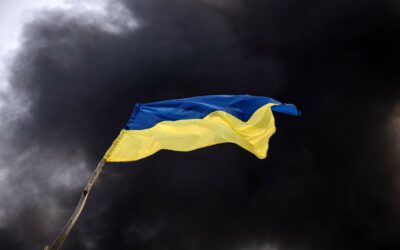
In Future Wars, Drone Weapons With Minds of Their Own
SUBSCRIBER+EXCLUSIVE BRIEFING — Drone weapons are part of the daily narrative of the war in Ukraine – from Russia’s use of Iranian drones against infrastructure […] More
MOVIE REVIEW: The Spy Behind Homeplate (a documentary)
by James Periard
James Periard served over 25 years in the Central Intelligence Agency as a Case Officer for Middle East and counter terrorism operations, including as a Chief of Station and Chief of Base in several expeditionary locations. He now serves as CEO of Badger Strategic Services, LLC.
High praise and kudos are warranted for Aviva Kempner’s documentary, The Spy Behind Homeplate, a captivating and insightful exploration of the multi-talented Moe Berg, Major League Baseball’s quintessential journeyman catcher and the Office of Strategic Service’s original counterproliferation Case Officer.
The Berg documentary comes at a time when the rapidly growing genre could use a contribution from a master storyteller like Kempner. Her Burns-esque style carries us back to a time, place and era that has real relevance today… in both baseball and war. Kempner expertly curates the seldom-seen footage from baseball’s archives to introduce us to a most compelling character, a sharp and affable journeyman ballplayer who joins the OSS in the heady days of WWII.
Moe Berg spent a remarkable 15 years in the major leagues, played for five teams, including the Washington Senators, but spied for one country, as the tag line delivers. In eye-catching black and white footage, Berg appears alongside early-game icon Babe Ruth on a two-week boat journey to Japan to participate in a pre-war, all-star baseball exhibition. Berg, the son of immigrants from Ukraine, already spoke numerous languages (and couldn’t hit in any of them, as the joke goes), and naturally immersed himself in one more on the voyage, Japanese. By the time the boat landed, Berg had conversational Japanese, much to Ruth’s surprise! “I thought you said you don’t speak Japanese?” the affable Ruth provoked. “That was two weeks ago,” the witty Berg replied.
Notables from Major League Baseball, including former commissioner and owner of the Milwaukee Brewers, Bud Selig, ESPN icon Larry Merchant, journalist David Ignatius, biographer Nicholas Dawidoff, MLB historian John Thorn and OSS Society President Charles Pinck, all add heart-felt commentary. Kempner smartly links their warm anecdotes to the rare film footage to deliver a strong sense of Berg’s character inside the poignant pre-war era.
The story takes us to the onset of war and Berg’s entry into the fabled OSS. His mission was to collect intelligence on the status of the German effort to develop a nuclear weapons capability. Berg pressed forward with allied forces in southern Europe, tracking down noted scientists with information of possible interest, including the whereabouts and status of one Werner Heisenberg, a key leader of the nascent German nuclear program. Understanding Heisenberg would help paint the picture of the size and scope of the alleged hidden German nuclear program. But Berg also had a second mission, what we might call today a covert action — an authorization to affect outcomes, if deemed necessary.
Most remarkable is how this vintage OSS story – as told by Kempner — has application today. In a world still beset by authoritarian leaders and nations interested in secretly building a nuclear weapons capability, in some sense, Berg’s work continues. So, what can we take away from the story of Moe Berg? Never stop learning. First, and foremost, Berg maintained a daily focus on the changing environments abroad — especially including the rise of fascism. He was a voracious reader, consuming paper after paper to not only stay current but discern trends.
More than ever, we need to go beyond classified holdings and dig into all aspects of open source modern media, including social intelligence. Berg knew he had to understand the developing stories to understand the changing culture. Only through understanding culture and what’s gone before, can sound policy be made.
Go where they need you most. Berg displayed gratitude and was service-oriented. In baseball, he played where needed, fatefully converting to catcher to fill in on short notice. Later, he moved to a player-mentor role, dutifully supporting a common team effort, helping new players move up and improve. When war broke out, his father, a hard-working immigrant, insisted he and his brother both do their duty to the country. The best intelligence officers likewise deploy when and where needed, occasionally traveling on short notice into harm’s way to gain the best understanding of the adversary’s position and intent.
Always be decent. Professional bearing. Moral character. High standards. These are but a few of Bergs attributes, elements that make up what might simply be called, decency. Decency is the quality that a professional draws upon when all is not clear and prior written instructions are not available. An ability to do what’s morally right in the emerging moment. Berg had it completely, an internal, moral compass, with a humanist’s appreciation for his fellow man. He went to war to fight oppression, but never lost his moral bearing.
This remarkable story of OSS and baseball culminates with Berg tracking down senior German nuclear scientist Heisenberg in neutral Switzerland and has the opportunity – and authority – to kill him, if he (Berg) deemed necessary. I asked movie Director Kempner why she thought Berg didn’t pull the trigger that fateful evening? The records, she said, indicate Berg came to understand that Heisenberg, and the state of the German program, were not so advanced to have warranted that action. He made the right call, of course, but I wondered if someone less decent would have done otherwise?
Berg’s story should help reinforce our common need for the quality of decency amongst professionals. In times of great stress, when positive outcomes are not certain, we ought not to devolve to low standards or become like our adversaries. Today’s officers, like Berg in WWII, need to continue to display such professional grounding, and when moments arise and circumstances warrant, hold a hand up and ask: what goes on here?, are we becoming like them?, who are these partners?, or, where is that information going? We’d all do well to follow Berg’s three-part ethos: Never stop learning. Volunteer for the hard stuff. And always, always, always be decent.
Kempner’s thoughtful exploration of Berg’s exceptional decency will be playing in a special showing at the CIA and a number of venues in the coming weeks.
*The Cipher Brief receives a small commission if you purchase products via the amazon links within the story.
Read more national security news, insight and analysis in The Cipher Brief
Related Articles

SUBSCRIBER+EXCLUSIVE BRIEFING — Drone weapons are part of the daily narrative of the war in Ukraine – from Russia’s use of Iranian drones against infrastructure […] More

SUBSCRIBER+ EXCLUSIVE ANALYSIS — Iran’s retaliatory strikes against Israel this weekend were both a potentially game-changing, historic first — and an underwhelming response. Historic, because […] More

SUBSCRIBER+EXCLUSIVE INTERVIEW — Ukraine was hit by a fresh round of Russian missile attacks on Thursday, strikes that targeted and damaged the country’s power grid […] More

SUBSCRIBER+ EXCLUSIVE REPORTING — The Israeli drone strike that killed three adult sons (who Israel says were Hamas operatives) and four grandchildren of Hamas’s Qatar-based […] More

BOTTOM LINE UP FRONT – In the spring of 2022, Ukraine beat back a Russian assault on the nation’s capital and punished the invaders on […] More

SUBSCRIBER+EXCLUSIVE — The Ukraine war has reached a “pivotal moment,” a “critical stage,” an “inflection point“ – all phrases used to describe the current situation […] More
Search